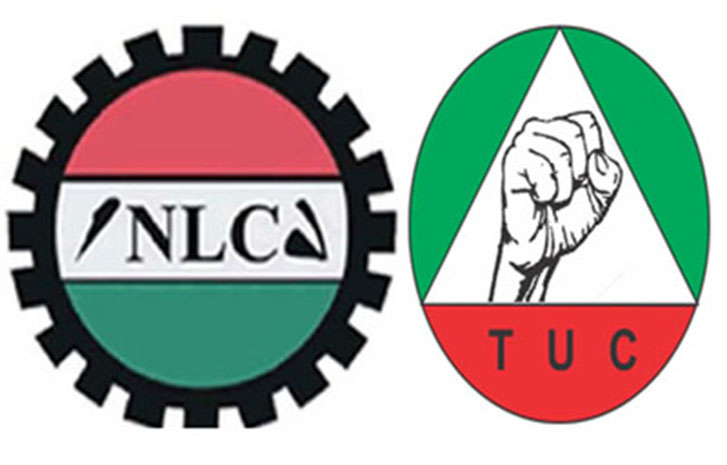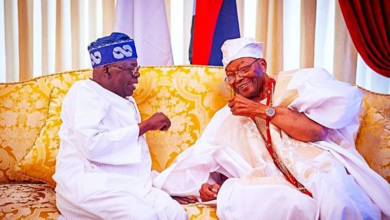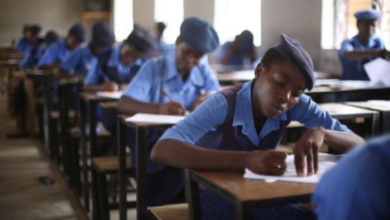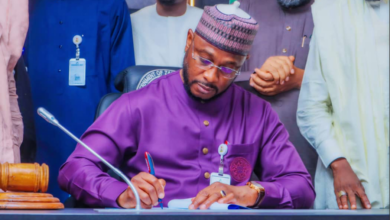NLC, TUC Agree To Suspend Tomorrow’s Planned Strike

After several hours of heated deliberations, the Federal Government on Monday was able to persuade the leadership of the Trade Union Congress of Nigeria (TUC) and Nigeria Labour Congress (NLC) to shelve their proposed strike which was to commence tomorrow.
The meeting also agreed to activate a tripartite committee that would review the current national minimum wage.
All the stakeholders involved in the deliberation are to reconvene on June 19 to deliberate on modalities for effective implementation of their agreement.
The meeting which lasted for over six hours at the Presidential Villa, Abuja, had former NLC President, Adams Oshiomhole; the Group Managing Director of Nigerian National Petroleum Company Limited (NNPCL), Mele Kyari; NLC President, Joe Ajaero; TUC President, Festus Osifo; Speaker of the House of Representatives, Femi Gbajiabiamila, among others in attendance.
Part of other demands from the two labour centres on, which the Federal Government is expected to meet, is the boosting of road and rail infrastructure to cushion the effect of the subsidy removal policy which has been effected by the Bola Ahmed Tinubu led administration since May 29 while taking oath of office.
Earlier, in the wake of grievances over the removal of fuel subsidy, the Trade Union Congress of Nigeria (TUC) had demanded an increase in the national minimum wage from N30,000 to N200,000.
The demand which has already been forwarded to the Federal Government, is part of conditions being put forward by the labour union to shelve it proposed strike, in the wake of the sudden removal of fuel subsidy by government.
A list of other demands is contained in a joint statement signed by Comrade Festus Osifo, President, TUC, and Comrade Nuhu Abba Toro, Secretary General, respectively, which was also made available to newsmen on Monday.
TUC also wants government to revert back to the old fuel pump price of N195 while negotiation continues.
“Minimum wage should be increased from the current N30,000 to N200,000 before the end of June 2023 with consequential adjustment on cost of living allowance (COLA), like feeding, transport, housing,” TUC stated.
The union said a representative of state governors will be party to this new minimum wage and all the governors must commit to implement the new wage.
It also wants tax holiday for employees both in government and private sector that earn less than N200,000 or $500 monthly whichever is higher.
“We want PMS allowance to be introduced for those earning between N200,000 to N500,000 or $500 to $1,200 whichever is higher.
“The exchange rate for retailing PMS in the country must be kept within a limit of +- 2% for the next ten years where the fluctuation is more that 2%, the minimum wage will automatically increase at the same rate.
“Setting up of intervention fund where government will be paying N10 per litre on all locally consumed PMS. The primary purpose of this fund is to solve perennial and protracted national issues in education, health and housing. A governance structure that will include labour, civil society and government will be put in place to manage the implementation.
“The Federal Government should provide mass transit vehicles for all categories of the populace.
“State governments should immediately set up a subsidized transportation system to reduce the pressure on workers and students. The framework around this will be worked out.
“Immediate review of the National Health Insurance Scheme to cover more Nigerians and prevent out of stock of drugs.
“Visitation of the refineries that are currently undergoing rehabilitation to ascertain state of work and setting up timeline for its completion.
“The president should direct who ever will be labour minister to immediately constitute the National Labour Advisory Council (NLAC). This platform will be used by government, labour and employer to discuss issues and policies of government that may affect workers and all other mandate as specified in the law.
“Provision of subsidy directly for food items, the $800 million could be a first step.
“The existing National Housing Fund (NHF) should be made accessible to genuine workers, the framework on this must be discussed and agreed.
“Medium term, deployment of compressed natural gas (CNG) across the country in line with the earlier promise made by government. The framework and timeline will be developed and agreed by both parties.
“Labour and government to design a framework that will be geared towards the reduction of cost of governance by 15% in 2024 and 30% by 2025.
“A framework should be immediately put in place to maintain the road and expand the rail networks across the country. Government must design a framework for social housing policy for workers through rent to own system.
“The state of electricity in the country must be appraised and an action plan should be defined with timelines on how to get this fixed. A strong monitoring team comprising of all parties will be constituted,” the statement added.
Court Halts Wednesday’s Planned Strike.
Meanwhile, Justice O. Y. Anuwe of the National Industrial Court sitting in Abuja, on Monday, had earlier restrained the Nigeria Labour Congress (NLC) and the Trade Union Congress (TUC) from embarking on the planned nationwide strike scheduled to begin on Wednesday, June 7.
Justice Anuwe made the order upon an ex parte application drawn from a suit marked NICN/ ABJ/158/2023, dated June 5, and filed by the Federal Government, and the Attorney-General of the Federation and Minister of Justice, against the two trade unions.
The motion was moved by Maimuna Lami Shiru (Mrs.), DCL, Federal Ministry of Justice.
After listening to the government lawyer, Justice Anuwe held that “the defendants/respondents are hereby restrained from embarking on the planned industrial action/or strike of any nature, pending the hearing and determination of the motion on notice dated 5th June 2023.
“It is ordered that the defendant/respondents be immediately served with the originating processes in this suit, the motion on notice and the order of this court hereby made.
“The motion on notice is hereby fixed for hearing for 19th June 2023.
“Hearing notices to that effect shall be served on the defendants/ respondents along with the other processes”, Justice Anuwe ordered.
In moving the ex parte motion, the Federal Government lawyer had pointed out that the proposed strike action is capable of disrupting economic activities, the health sector and the educational sector.
Mrs. Lami Shiru exhibited the notices from the 1st defendant and the Nigerian Union of Journalists (NUJ), respectively, to their members, to withdraw their services with effect from Wednesday, June 7, 2023.
Counsel to the Federal Government, the court noted, stated that by Section 7(b) of the National Industrial Court Act 2006, the court is empowered and indeed is clothed with exclusive jurisdiction in matters relating to the grant of any order to restrain any person or body from taking part in any strike, lock out or any industrial action or any conduct in contemplation or in furtherance of strike, lock out or any industrial action.
According to Mrs. Lami Shiru, Sections 16 and 19(a) of the NIC Act2006, alsoempoweredthecourt to make orders or grant urgent interim reliefs.
More so, it was the argument of the Federal Government counsel that the urgency enumerated in the affidavit of urgency and in counsel’s submission reveals a scenario that may gravely affect the larger society and indeed the well-being of the nation at large.
The court noted that counsel to the claimants had pointed out that students of secondary schools nationwide, especially those writing WAEC exams will be affected; the tertiary institutions who have only just resumed after a long ASUU strike will also be affected, not leaving the health sector, amongst other sectors; and above all, the economy of the nation.
“In my view, this is a situation of extreme urgency that will require the intervention of this court.”
Having, therefore, considered the totality of the application, the court said it was minded to grant the reliefs as prayed by the Federal Government.
In the motion ex parte, the Federal Government had prayed for an order of interim injunction restraining the defendants/ respondents, their members, their agents, employees, workmen, servants, proxies or affiliates from embarking on the planned industrial action and/or strike of any nature pending the hearing and determination of the claimants/ applicants’ motion on notice for interlocutory injunction.
Culled from independent.ng





